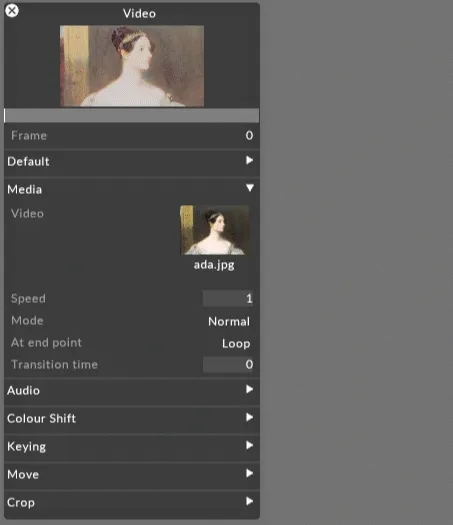Content properties
Content properties are sometimes known as Video clip properties and can be accessed be right-clicking a content file thumbnail from a layer.
Content properties are unique to a content file. So, by changing the content properties on a piece of content, these properties will apply whenever that clip plays on any layer. The exception to this is if you’ve duplicated the clip instance within the VideoClip library.
Accessing content properties
Section titled “Accessing content properties”Content properties can be access by right-clicking an asset from acontent layer such as:

General properties
Section titled “General properties”All properties displayed at the top of the editor are read only.
Number of frames
Section titled “Number of frames”Specifies the number of frames within the file.
Resolution
Section titled “Resolution”Specifies the file resolution.
Specifies the Codec for the file.
Bits per Channel
Section titled “Bits per Channel”Specifies the bits per channel of the file.
Has Alpha
Section titled “Has Alpha”Specifies whether the file has an Alpha channel or not.
Has Audio
Section titled “Has Audio”Specifies whether the file has embedded Audio or not.
Original FPS
Section titled “Original FPS”Specifies the original Frames Per Second of the file.
Data rate
Section titled “Data rate”Specifies the data rate in megabytes per second of the file.
The Edit properties can all be altered to suit user requirements.
Sets the Frames Per Second for the content. For example, doubling the FPS will cause to display the same frame twice in a row, and half the FPS would cause to display every other frame.
Clip start: Specifies the start frame.
Clip end: Specifies the end frame.
Loop in: Specifies the in frame.
Loop out: Specifies the out frame.
Filtering
Section titled “Filtering”Bilinear filtering
Section titled “Bilinear filtering”Specifies whether Bilinear filtering is on or off for that content.
Bilinear filtering is a texture filtering method used to smooth textures when displayed larger or smaller than they actually are.
Frame blending
Section titled “Frame blending”Specifies whether frame blending is on, off or automatic for the content.
Deinterlace method
Section titled “Deinterlace method”This option is only available for live video inputs and allows you to specify a deinterlacing method. For more information, see Interlaced video capture.
Quantisation
Section titled “Quantisation”Quantised
Section titled “Quantised”When set to No, the content will play at its defined frame rate. When set to Yes, the content will play at the specified number of beats.
The number of beats the content should play back to when the Quantised property is set to Yes.
Cropping
Section titled “Cropping”Clip type
Section titled “Clip type”Specifies the clip type the content should use. This property used to be held in the direct mapping in previous versions of .
Clip to canvas: Clips the content to the canvas.
Fit into canvas: Fits the content to the canvas, but can result in ‘black bars’ of empty space along one axis of the content.
Stretch to canvas: Stretches the content so it fits the whole canvas, while ignoring aspect ratio.
Pixel-perfect: Displays the content, pixel perfect and does not stretch or scale in any way.
Zoom point
Section titled “Zoom point”Crop left/right/top/bottom
Section titled “Crop left/right/top/bottom”Crop can be used to crop the canvas manually. Entering minus values creates additional black space around the content.
Colour shift
Section titled “Colour shift”Colour shift
Section titled “Colour shift”Defines the colour shift for the clip. Colour shifts allow you to specify brightness (shift), contrast (scale), saturation scale, Hue shift, RGB control as well as Keying threshold, Hardness and Key colour. See Colour shifts for more information.
Colour profile
Section titled “Colour profile”This property allows you specify a colour profile for the content. Colour profiles consist of a colour space and gamma curve specification. See Colour profiles for more information.
Versions
Section titled “Versions”Proxies
Section titled “Proxies”This property shows the available proxy files for the content. For example Full, 1/2, 1/4 and 1/8 resolution.
VideoAsset
Section titled “VideoAsset”This defines which video file is being played. Right-clicking this thumbnail will open the version control editor which allows for specifying which version of content is being used. For more information see Content versioning.